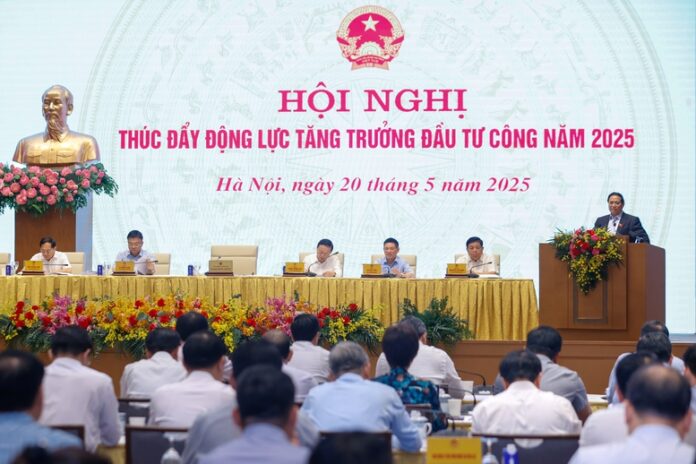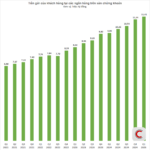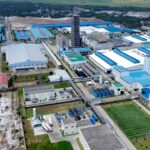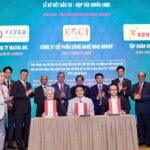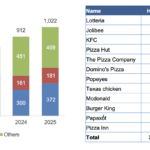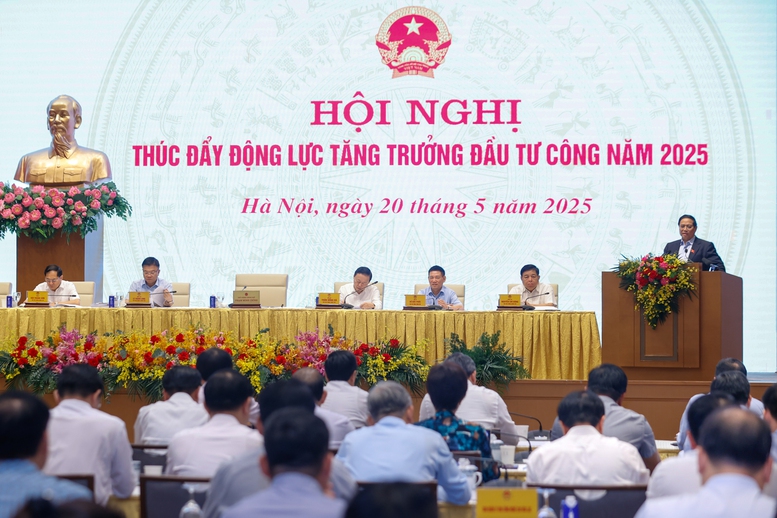
Prime Minister Pham Minh Chinh chairs the Conference on Promoting Investment Growth Momentum in 2025 – Photo: VGP/Nhat Bac
The conference was held virtually from the Government Office to the People’s Committees of provinces and centrally-run cities. Attending the conference were Politburo members, Central Committee members, Deputy Prime Ministers, leaders of ministries, sectors, central agencies, provinces and cities, economic groups, and state corporations.
The year 2025 is of special importance; it is the year of many great events of the country; it is the year of acceleration and completion of the socio-economic development plan for the 2021-2025 period, the medium-term public investment plan for the 2021-2025 period; it is also the year of preparation for a new era – an era of prosperity and civilization for the nation, towards two strategic goals for the centenary.
To achieve these strategic goals, the Party, State, and Government have set a growth target of 8% or more in 2025 (the previous target was 6.5-7%), creating momentum and a double-digit growth rate in the following period. The target for public investment disbursement in 2025 is 100% (the previous target was 95%).
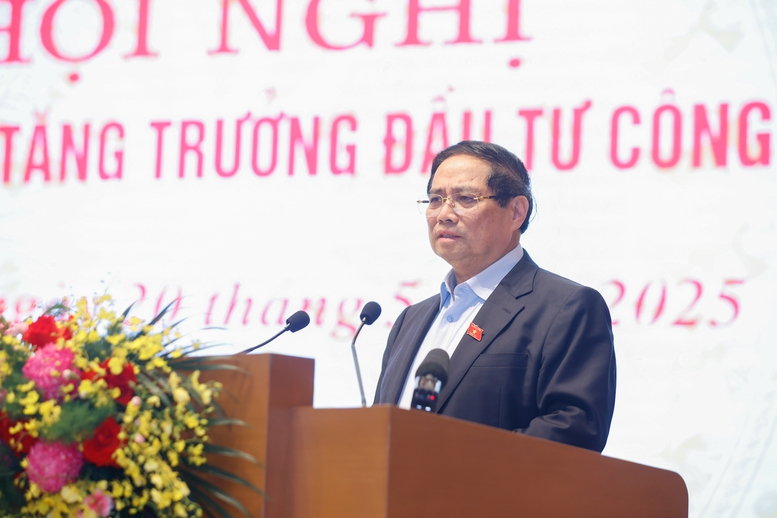
Prime Minister Pham Minh Chinh speaks at the conference – Photo: VGP/Nhat Bac
Public investment has always been identified as a crucial political task, playing a pivotal role in socio-economic development, ensuring national defense, security, and political stability. Public investment has both long-term strategic significance and immediate urgency, making significant contributions to promoting growth, macroeconomic stability, and maintaining the economy’s major balances. It provides the foundation for the development of socio-economic infrastructure, acts as a “pathfinder”, unblocking bottlenecks, creating new momentum and development spaces, enhancing connectivity, reducing logistics costs, and improving national competitiveness.
Public investment also serves as “seed capital”, attracting and catalyzing overall social investment, strongly promoting private investment and FDI inflows. It boosts production and business activities, generates employment and livelihood opportunities for the people, and contributes to social security.
In the past, the Government and the Prime Minister have always paid great attention to and directed the vigorous promotion of public investment disbursement, implementing three national target programs and projects using the additional central budget revenue right from the first days and months of 2025.
Specifically, focus has been placed on完善public investment institutions, including submitting the Law on Public Investment No. 58/2024/QH15 dated November 29, 2024, to the National Assembly for approval and organizing its implementation from January 1, 2025, with many new provisions aimed at creating breakthroughs, promoting reform, and enhancing decentralization and delegation of authority.
The Prime Minister has issued 01 directives, 03 telegrams, and many documents directing the promotion of public investment disbursement. In addition, the Prime Minister’s telegrams and directives on promoting growth also set out tasks and solutions to promote public investment disbursement.
Meetings of the Government’s Standing Committee and regular Government meetings have included content related to public investment. Along with this, the role of the seven working groups of the Prime Minister has been promoted in working with localities to inspect and urge public investment disbursement, while ministries, central agencies, and localities have also established working groups to promote the disbursement of the state budget investment plan.
The disbursement result in the first four months was over VND 128.5 thousand billion, about VND 18 thousand billion higher than the same period in 2024. However, nearly VND 8 thousand billion has not been allocated in detail; the public investment disbursement rate in the first four months of 2025 was 15.56%, lower than the same period in 2024 (16.64%), with many ministries, agencies, and localities having a disbursement rate below the national average.
Evaluate officials in places with slow disbursement
Opening the conference, Prime Minister Pham Minh Chinh emphasized that we are living in the historic days of April and May with an even more drastic and bold spirit. In the current context, we are resolutely renewing the three traditional growth drivers, including investment, consumption, and exports; and promoting new growth drivers such as science and technology, innovation, digital transformation, circular economy, knowledge-based economy, and drivers related to the private sector.
While promoting new growth drivers takes time and has a lag, we must strive to consolidate and promote traditional growth drivers. However, consumption and exports are currently facing many difficulties, and our efforts to diversify markets, products, and supply chains have not yet been effective immediately.
Therefore, among the traditional growth drivers, the investment driver plays a very important role, including public investment, FDI, and private investment. Public investment is identified as the driver of private investment and the catalyst for all resources for development.
Reviewing the results of public investment in the first months, in which 37/47 ministries and agencies and 27/63 localities had a disbursement rate below the national average, the Prime Minister requested to clarify this issue, find out the reasons, and identify difficulties, obstacles, and bottlenecks, as well as the responsibilities of the ministries and sectors. “Why, with the same conditions and policies, do some places perform well while others do not? Is it due to human factors or the leaders?” the Prime Minister questioned.
The Prime Minister requested that the Ministry of Finance compile a list of ministries, sectors, and localities with slow disbursement for evaluation of officials. Those who perform well should be rewarded, and those who do not should be held accountable. At the same time, we need to draw lessons in leadership and direction, organization, and implementation at all levels and sectors, especially the leaders, to “identify the right pulse and the right illness” to have appropriate solutions, and have principles and tools to regularly monitor and urge, promoting the role of the working groups of the Prime Minister.
The Prime Minister suggested that leaders of Party committees, authorities at all levels, and officials and party members must think, study, and continue to review and propose amendments to institutions and policies to remove obstacles, especially laws related to the budget, bidding, because, in reality, private enterprises often disburse and implement projects very quickly. Levels and branches from the central to local levels must be more determined, more active, and more positive in assigning tasks with “clear persons, clear jobs, clear responsibilities, clear progress, clear results, and clear authority”, showing a sense of responsibility for the country and their work, not letting the situation of “having money but unable to spend” happen.
The Prime Minister emphasized the need to strengthen decentralization and delegation of power to localities, along with allocating resources, improving implementation capacity, and enhancing inspection and supervision, with the spirit of “localities decide, localities do, and localities take responsibility”. Ministries and central agencies should focus on performing state management tasks and not intervene in specific matters. State corporations and groups must also be proactive in promoting investment.
The Government Portal will continue to update information about the conference.
The New Deposit Dash: VPBank, SHB, and HDBank Surge Ahead as Vietcombank, TPBank, and SeABank Stumble With Negative Growth
“Customer deposits at Vietcombank dipped by over VND 5.5 trillion in the first quarter of the year, following two consecutive booming quarters in 2024. TPBank and SeABank also went against the grain, witnessing decreases of nearly VND 9.7 trillion and VND 8.3 trillion, respectively. Conversely, VPBank experienced its strongest quarter ever in terms of attracting deposits.”
The Quiet Korean ‘Chaebol’ Makes a Move in Quang Nam
“In a significant move, one of the top 30 economic conglomerates in South Korea has chosen to adopt LNG as the energy source for its industrial complex in Quang Nam. This decision underscores the company’s commitment to sustainable practices and positions it at the forefront of Korea’s energy transition.”
“Japanese and Middle Eastern Conglomerates Eye $6 Billion Investment in Ho Chi Minh City”
“Huge investments are pouring into Ho Chi Minh City, with foreign conglomerates committing a staggering 6 billion USD for various projects. This significant influx of capital underscores the city’s thriving business landscape and its appeal as a prime investment destination.”
The Ultimate Guide to the Fast Food Boom in Vietnam: Unveiling the Top Players in the Game
The fast-food market in Vietnam is experiencing a significant surge in 2025, with an impressive 110 new store openings. This thriving industry is witnessing a rapid expansion, indicating a strong appetite for quick, convenient, and delicious dining options among Vietnamese consumers. With each new store, the market accelerates, catering to the diverse tastes and preferences of its customers.

